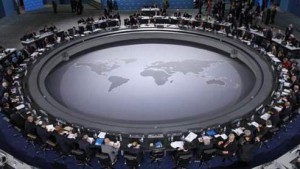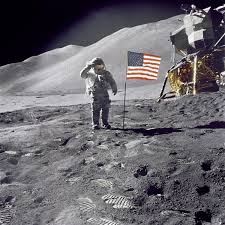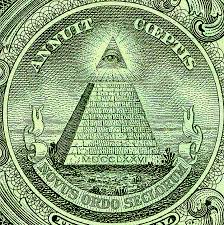Why the quotes around “conspiracy theory”? Because I’ll be debunking the term “conspiracy theory”, not the ideas referred to as conspiracy theories. The purpose of the term is to attack any non-conformist idea about how the world works, without actually engaging the idea itself. It’s a way of shutting off the brain and letting the mainstream media and government textbooks do your thinking for you.
This is not to say that all theories of the world, or allegations of conspiracy, are correct, or tend to be correct. Many are incorrect or simply unsubstantiated. This article is also not a defense of conspiratorial thinking, or belief that historical events can only be explained by conspiracies. The point is not about any particular idea, but how we evaluate all ideas: Giving some undue credence, while ignoring others because they don’t fit the standard narrative.
Frequently, establishment shills in the media and academia “debunk” such crazy “conspiracy theories”, or even conspiracy theories as such, as if there is no intellectual escape from their approved opinions. Let’s debunk the debunkers!
“Conspiracy theory” as rhetorical device
 Before debunking specific arguments, let’s look at “conspiracy theory” as a rhetorical device. It is not selected haphazardly. The word “theory” connotes speculation, uncertainty, whimsy, in everyday usage. Just as some creationists mock evolutionary theory because it is “just a theory”, debunkers attack the validity of an idea before even engaging it. Doesn’t matter if your idea is based on documentation and facts cited by reputable sources – it’s just a “theory”.
Before debunking specific arguments, let’s look at “conspiracy theory” as a rhetorical device. It is not selected haphazardly. The word “theory” connotes speculation, uncertainty, whimsy, in everyday usage. Just as some creationists mock evolutionary theory because it is “just a theory”, debunkers attack the validity of an idea before even engaging it. Doesn’t matter if your idea is based on documentation and facts cited by reputable sources – it’s just a “theory”.
Simply calling an idea speculative isn’t enough though. It’s too arbitrary. We need a specific, descriptive modifier, to give the appearance of solidity to the attack. Ah! “Conspiracy” – Sounds so shadowy and creepy. Grammatically, it is a modifier on “theory”, creating the impression that the theory itself is conspiratorial and dark, as are the people who espouse such crazy ideas. Thus we have “conspiracy theory” – the perfect, catch-all answer to any non-conformist idea about the world!
In an ironic twist, it turns out the CIA actually coined and promoted the term “conspiracy theory” for precisely this purpose.
Double standards
 Notice how mainstream conspiracy theories are never referred to as “conspiracy theories”? I mean, bin Laden and his merry band of hijackers supposedly had a secret conspiracy to take down the World Trade Center towers with planes. If anyone but the mainstream media proposed this story, it would be labeled a crazy conspiracy theory! But no, it’s a perfectly valid view of history, despite inconsistencies and discrepancies. On the other hand, the idea that there were perhaps other actors involved in the operation, perhaps even in the US government, well that’s just a crazy “conspiracy theory”! So, it’s not a descriptive term at all. It’s a rhetorical device to invalidate a non-conformist idea before it’s even considered.
Notice how mainstream conspiracy theories are never referred to as “conspiracy theories”? I mean, bin Laden and his merry band of hijackers supposedly had a secret conspiracy to take down the World Trade Center towers with planes. If anyone but the mainstream media proposed this story, it would be labeled a crazy conspiracy theory! But no, it’s a perfectly valid view of history, despite inconsistencies and discrepancies. On the other hand, the idea that there were perhaps other actors involved in the operation, perhaps even in the US government, well that’s just a crazy “conspiracy theory”! So, it’s not a descriptive term at all. It’s a rhetorical device to invalidate a non-conformist idea before it’s even considered.
 Also, notice how the epistemic standards applied to non-conforming ideas are much, much higher than those applied to conforming ideas. The burden of proof is through the roof! No matter how much evidence you present, and how consistent your theory is with human behavior, the debunkers will demand absolutely undeniable physical proof of every part of the claim. Of course, mainstream narratives face no such requirements. No matter how ridiculous the claims get, such as the Syrian government supposedly attacking its own civilians with chemical weapons, no proof is demanded whatsoever. It’s all about maintaining the party line, conforming to the establishment narrative, and not at all about finding the truth.
Also, notice how the epistemic standards applied to non-conforming ideas are much, much higher than those applied to conforming ideas. The burden of proof is through the roof! No matter how much evidence you present, and how consistent your theory is with human behavior, the debunkers will demand absolutely undeniable physical proof of every part of the claim. Of course, mainstream narratives face no such requirements. No matter how ridiculous the claims get, such as the Syrian government supposedly attacking its own civilians with chemical weapons, no proof is demanded whatsoever. It’s all about maintaining the party line, conforming to the establishment narrative, and not at all about finding the truth.
Answers To: “Conspiracies can’t last because someone will talk.”
 The biggest argument the debunkers love is that conspiracies are inherently unsustainable because eventually, one of the conspirators will talk and blow the whole thing out of the water. Nevermind the piles of conspiracies throughout history that falsify this argument, let’s examine the logic.
The biggest argument the debunkers love is that conspiracies are inherently unsustainable because eventually, one of the conspirators will talk and blow the whole thing out of the water. Nevermind the piles of conspiracies throughout history that falsify this argument, let’s examine the logic.
This argument usually gets presented with something like the faked moon landing theory, that, well, there were all these people involved, all these engineers, and nobody spoke up? You’d think among thousands of people involved in a conspiracy, at least a few would blow the cover.
Well hang on a second. Isn’t that exactly what the CIA is? And every other intelligence agency. How do they manage to have an organization of thousands of people and keep things secret? Yes, NASA is not the CIA, but it’s not the Boy Scouts either. NASA had national security objectives and keeping such secrets, even among many people, is precedented.
If people’s interests are aligned in an organization, it’s indeed possible to keep a conspiracy secret. This is done by aligning financial interests, making sure everyone gets a piece of the pie, or by threat of punishment. If you talk, we’ll come after you and your family. These methods are well known and effective.
 The “someone will talk” argument also ignores compartmentalization. The CIA uses it all the time. The idea is that not everyone involved in executing a secret plan has to know the exact nature of the plan. Most of the staff for a fake moon landing might not be aware it’s fake, just fed simulated information. Only a few people need to be aware of the reality. Again, I’m not arguing for the faked moon landing theory, just pointing out why this argument against it is weak.
The “someone will talk” argument also ignores compartmentalization. The CIA uses it all the time. The idea is that not everyone involved in executing a secret plan has to know the exact nature of the plan. Most of the staff for a fake moon landing might not be aware it’s fake, just fed simulated information. Only a few people need to be aware of the reality. Again, I’m not arguing for the faked moon landing theory, just pointing out why this argument against it is weak.
Lastly, simply releasing information to the public doesn’t mean anyone will pay attention. The apathetic public yawns when past conspiracies are regularly outed and finally admitted to. The debunkers conveniently ignore those. And if any conspiracists did come forward and admitted the moon landing was faked – the debunkers would be the first to dismiss them as wackjobs! So, there’s no winning with these people.
Answers To: “There have never been conspiracies.”
 The implication of debunking “conspiracy theories” as such is that there have never actually been any conspiracies in history. Of course, this is obviously false. Past conspiracies are well-documented, but I’ll just mention a couple that are now accepted as historical fact.
The implication of debunking “conspiracy theories” as such is that there have never actually been any conspiracies in history. Of course, this is obviously false. Past conspiracies are well-documented, but I’ll just mention a couple that are now accepted as historical fact.
The meeting in 1913 on Jekyll Island that formed the Federal Reserve was a quintessential conspiracy, that now is simply accepted historical fact, albeit ignored.
The Gulf of Tonkin incident, a purported attack on US ships by North Vietnam that provided the basis for the Vietnam War, ended up being … nothing but radar ghosts. The war was planned long before and this was merely a contrived pretext. Sound familiar?
There are also many later-declassified plans that did not go through initially, but which provide a blueprint for future action. Operation Northwoods was a US military plan to cause false flag attacks and blame them on Cuba, to provide justification for overthrowing the Cuban government. Such operations demonstrate the mentality and means of those in power. Does anyone really believe such plans were scuttled and forgotten about after the 1960s?
Answers To: “We can only know about the world by the particular facts we can directly observe.”
 This argument is an inversion of the scientific method. Science derives universals about the world through experimentation and then deductively applies them to particulars. Saying that we must prove all particulars is ludicrous: it implies we do have to be in the forest to know whether the tree that fell really did make a sound. It denies the reality of our limitations.
This argument is an inversion of the scientific method. Science derives universals about the world through experimentation and then deductively applies them to particulars. Saying that we must prove all particulars is ludicrous: it implies we do have to be in the forest to know whether the tree that fell really did make a sound. It denies the reality of our limitations.
The problem is that we simply can’t know every particular about the world, or even most of it. In social science, we can test theories about how the human world works, then deduce likely motives for particular actions. This applies to both current events and history.
 The old aphorism is that history is written by the victors. Unlike geology or biology, history doesn’t rely on physical evidence, but man-made accounts. These are inevitably colored by prejudice and agendas, distorted, hidden, destroyed, censored. Most of human history is simply unavailable to us. We are forced into making judgments according to a present-day worldview, which is why it’s incredibly important to constantly critique and revise our notions about history.
The old aphorism is that history is written by the victors. Unlike geology or biology, history doesn’t rely on physical evidence, but man-made accounts. These are inevitably colored by prejudice and agendas, distorted, hidden, destroyed, censored. Most of human history is simply unavailable to us. We are forced into making judgments according to a present-day worldview, which is why it’s incredibly important to constantly critique and revise our notions about history.
What is true of history is true of the present. Direct experience is very limited for most people. We rely on media and others for our knowledge about the world. At each step in this knowledge-gathering process lies the potential for distortion. Media can be bought, manipulated, censored. Individuals can be threatened, rewarded, or they self-censor based on their perceived risk. Documents, meetings and finances can be hidden.
 All is not always what it seems. We have to read between the lines to understand the motivations of players, which are critical for filling in the blanks about the world. If we restrict ourselves to proving particulars before accepting any theory of the world, then we are hopelessly at the mercy of whoever has power and influence in the present.
All is not always what it seems. We have to read between the lines to understand the motivations of players, which are critical for filling in the blanks about the world. If we restrict ourselves to proving particulars before accepting any theory of the world, then we are hopelessly at the mercy of whoever has power and influence in the present.
The danger of this approach of course, is the rabbit hole of conspiratorial thinking, that everything that happens in the world is planned that way. But vigilance and debate are the antidote, not dismissing ideas out of hand because they do not conform to the popular narrative. Just as natural science is not harmed, but actually powered, by constant hypothesis and revision, let the field of politics and history also be a marketplace of ideas.
